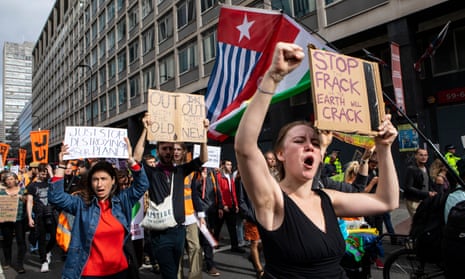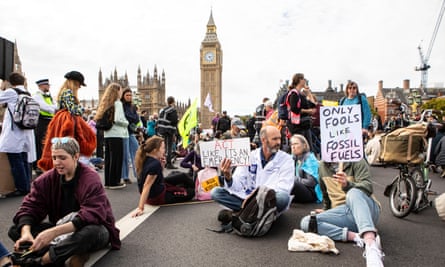cross-posted from the Guardian
Organisers hail largest wave of simultaneous protests seen in Britain for years as people turn out in over 50 towns and cities

The Just Stop Oil protest in central London on 1 October 2022 – the day regulator Ofgem’s price cap was due to rise. Photograph: Antonio Olmos/The Observer
Lizzie and Dnieper are new to the protest scene. But the mounting economic crunch, cost of living crisis and climate emergency have galvanised the young family.
“It’s a little bit scary out there at the moment – things are escalating fast,” said Dnieper Cruz, 32. Turning to his daughter Lumi, almost three, the teacher added: “We just want a better future for her generation.”
His partner, solicitor Lizzie Manchester, 32, said: “It’s time for us as a family to make our voices heard.”
Around them the crowd was building rapidly outside King’s Cross station in central London, just one demonstration among at least 50 being held in towns and cities across the UK on Saturday for people to register their anger at the cost of living crisis. Organisers describe it as the largest wave of simultaneous protests seen in Britain for years.
From Eastbourne to Edinburgh, Hull to Hastings, thousands turned up at protests timed to coincide with the jump in gas and electricity unit prices that will prompt bills to soar. Social media showed large crowds at events in Glasgow, Liverpool, Manchester, Newcastle and Belfast, among others.
In Glasgow thousands gathered on the Buchanan Galleries steps for a rally and chanted: “Tories, Tories, Tories! Out, out, out!” and “The workers, united, will never be defeated.”
Coordinated among multiple community organisations and trade unions to maximise their impact, Saturday’s protests were also staged against a backdrop of the biggest rail strike in Britain for decades.

‘It’s fantastic to see all the factions coming together’: Jade Anderson (centre) from Taunton, Somerset, attends the Enough is Enough rally at King’s Cross. Photograph: Andy Hall/The Observer
At King’s Cross, however, the station’s vast forecourt was crammed with protestors. Among them was Jade Anderson, 25, who had travelled up from Somerset to make the point that “enough is enough I just hope enough people mobilise for them to listen. It’s fantastic to see all the factions coming together,” she said, noting the alliance of transport unions, climate activists and social justice campaigns.
The trainee PT teacher said she was still forced to live with her parents because she couldn’t afford high rent costs.
“And the rising energy bills mean that we’re already collecting logs for the winter. My dad’s a builder and he’s putting in longer and longer shifts so we can afford to get by,” added Anderson.
The King’s Cross demo was one of at least six major demonstrations in the capital on Saturday, the combined volume of expected protestors prompting the Metropolitan police to earlier announce that it was “equally important that the rights of local residents, visitors and business owners are balanced with those who wish to protest”.
The warning did not stop climate protesters bringing the vital artery of Westminster Bridge to a standstill.

The Just Stop Oil protest at Westminster Bridge. Photograph: Antonio Olmos/The Observer
At around 2pm, dozens of activists sat on the road and played music, blocking traffic as others chanted slogans about the climate crisis.
Earlier, hundreds had also congregated outside Euston station before heading to Westminster Bridge.
The eclectic nature of those present was again quickly evident, with Just Stop Oil, Extinction Rebellion (XR) and the Revolutionary Communist Group (RCG) among the groups gathered. Some held banners denouncing capitalism “the enemy of Mother Earth”, with others protesting against the government’s recent mini-budget.
Back at King’s Cross, teaching assistant Farzana Khanom, 23, how her economic situation meant difficult choices, namely that she was having to choose between paying rising energy bills and investing in her career.
“But if we come together and make our voices heard then perhaps we can make a difference,” she said.
As she spoke, a recently launched petition calling for a general election to “end the chaos of this government” soared above 300,000 signatures by lunch.
Across the UK reports emerged of householders setting fire to their utility bills – a symbolic gesture promoted by Don’t Pay UK, a grassroots movement that has received almost 200,000 pledges from householders who are prepared to cancel their direct debits if a total of a million Britons commit to not paying.
The campaigners’ big precedent, the poll tax riots, took 4 million people refusing to pay – some of whom faced liability orders forcing them to pay – to get the government to scrap the levy.
The backdrop to the protests was the date when regulator Ofgem’s price cap was due to rise, with Liz Truss’s energy price guarantee meaning an average annual bill will be capped at £2,500 for two years from Saturday.


